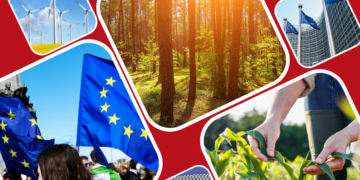
The new briefing paper from the Climate Team AMO provides insight into the roots of social polarization in the public discourse on climate change. Analyst Vojtěch Pecka reveals how strategic campaigns aimed at discrediting scientific conclusions about climate change contribute to this polarization.
These campaigns began to emerge in the early 1990s with the development of international dialogue on reducing greenhouse gas emissions, with the first attacks on climate science led by the fossil fuel industry in the USA. Gradually, similar tactics began to appear in Europe and the Czech Republic.
Pecka notes that attacks on science are a recurring phenomenon whenever scientific discoveries threaten the interests of powerful groups. As an example, he mentions the tobacco industry, whose techniques for obfuscating scientific knowledge about the negative health effects of smoking were later adopted by other actors, including the fossil fuel industry.
Special attention is given to the ideological dimension of the issue. Groups strongly defined by their adherence to various forms of free-market fundamentalism have been identified as key in efforts to discredit climate science. In the Czech context, this tendency is particularly associated with the figure of Václav Klaus. Pecka also highlights the influence of the domestic fossil fuel industry and the growing geopolitical ambitions of Russia, which, due to its dependence on fossil fuel exports, perceives the global transition to low-carbon energy sources as a threat.
Furthermore, the briefing paper emphasizes the role of conspiracy theories, which not only spread doubts about scientific findings but also increase social polarization and undermine public trust in the scientific community and other institutions. These phenomena seriously threaten society’s ability to effectively face the climate crisis.




